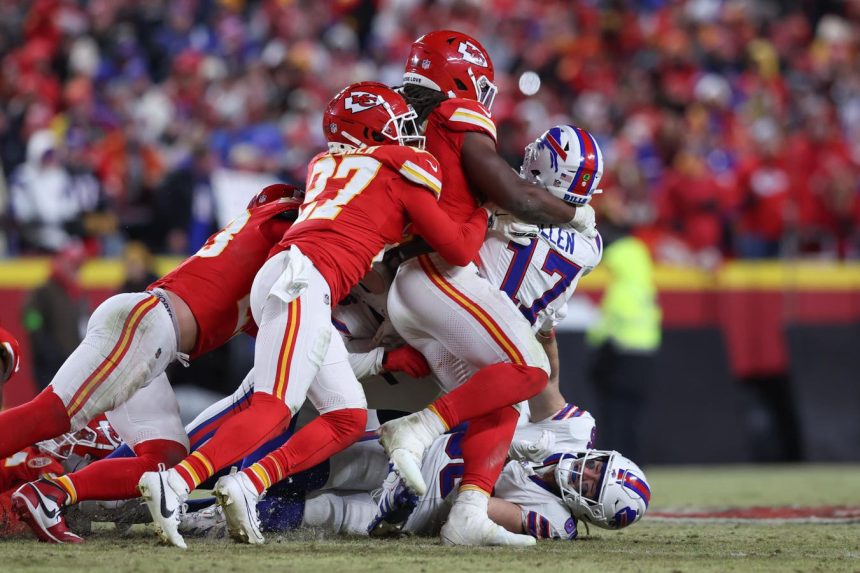The 2025 AFC Championship Game between the Buffalo Bills and the Kansas City Chiefs was a tightly contested affair, with the outcome hanging in the balance until the final whistle. A pivotal moment in the fourth quarter, with the Bills clinging to a 22-21 lead, became the focal point of controversy and ultimately shaped the trajectory of the game. Facing a crucial fourth-and-one situation just past midfield, Bills quarterback Josh Allen took matters into his own hands, attempting a quarterback sneak to extend the drive. Despite appearing to surge forward with enough momentum to secure the first down, the on-field officials ruled him short of the mark. This decision, upheld after a lengthy and tense booth review, effectively extinguished the Bills’ drive and shifted the momentum irrevocably in favor of the Chiefs.
The contentious call sparked immediate debate and criticism, with many observers, including CBS rules analyst and former NFL referee Gene Steratore, believing that Allen had indeed gained the necessary yardage. Steratore estimated that Allen had advanced the ball past the line to gain by “a third of the football,” suggesting a clear misjudgment by the officiating crew. However, the limited camera angles and the dense cluster of players surrounding the ball made it difficult to definitively ascertain whether the ball had crossed the first-down marker, leaving room for doubt and fueling the controversy. This ambiguity further intensified the frustration felt by the Bills and their fans, who perceived the call as a game-altering injustice.
Bills head coach Sean McDermott expressed his strong disagreement with the officiating decision, stating unequivocally that he believed Allen had reached the first-down marker. McDermott’s perspective, based on his close proximity to the play and the first-down marker on the sideline, added weight to the argument that the referees had erred in their judgment. His assertion that the first-down marker was “just inside that white stripe” and that Allen appeared to have reached it conveyed his conviction that the Bills had been unfairly denied a crucial first down. This sense of injustice was palpable in the post-game reactions from the Bills camp and their fanbase, who felt robbed of a potential game-winning drive.
While the controversial fourth-down call undoubtedly played a significant role in shaping the outcome of the game, it is important to acknowledge that it was not the sole reason for the Bills’ eventual defeat. The Chiefs, led by their experienced and resilient quarterback Patrick Mahomes, capitalized on the turnover on downs and promptly marched down the field to score a touchdown, taking a 29-22 lead. The Bills managed to tie the game at 29-29, demonstrating their resilience and determination, but ultimately fell short, losing 32-29 to the two-time defending Super Bowl champions. The loss marked the Bills’ fourth consecutive postseason defeat at the hands of the Chiefs, a recurring heartbreak that further underscored the significance of the controversial fourth-down call.
The missed opportunity to potentially extend the drive and perhaps even score a touchdown, solidifying their lead, became a turning point in the game. The Chiefs, seizing the momentum shift, were able to regain control and ultimately secure the victory. Had the call gone in favor of the Bills, the game’s trajectory might have been significantly different. The Bills, with a potential eight-point lead and continued possession, could have further pressured the Chiefs and potentially closed out the game. Instead, the controversial call served as a catalyst for the Chiefs’ comeback and ultimately contributed to the Bills’ agonizing defeat.
The aftermath of the game was dominated by discussions surrounding the officiating, with the fourth-down call becoming the centerpiece of the debate. While acknowledging that the game was not solely decided by this single play, the Bills and their fans were left to grapple with the what-ifs and the lingering sense of injustice. The close nature of the game and the potential impact of the overturned call only amplified the frustration and disappointment. For the Bills, the loss represented another chapter in their ongoing struggle to overcome the Chiefs in the playoffs, a hurdle they must find a way to clear if they are to achieve their Super Bowl aspirations. The controversial fourth-down call, while not the sole determinant of the outcome, undoubtedly cast a long shadow over the game and will likely remain a point of contention for years to come.



